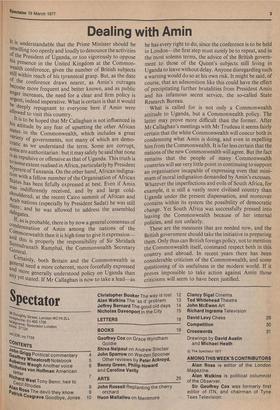Dealing with Amin
It is understandable that the Prime Minister should be unwilling too openly and loudly to denounce the activities °f the President of Uganda, or too vigorously to oppose hIS presence in the United Kingdom at the Commonwealth conference, given the number of British subjects stilI within reach of his tyrannical grasp. But, as the date 103f the conference draws nearer, as Amin's outrages ec°tne more frequent and better known, and as public anger increases, the need for a clear and firm policy is urgent, indeed imperative. What is certain is that it would be deeply repugnant to everyone here if Amin were all to visit this country. ,_. is to be hoped that Mr Callaghan is not influenced in His attitude by any fear of upsetting the other African states in the Commonwealth, which includes a great variety of governments, not many of which are democratic as we understand the term. Some are corrupt, iSorne are authoritarian : but it may safely be said that none to as or offensive as that of Uganda. This truth is Nei some extent realised in Africa, particularly by President Yerere of Tanzania. On the other hand, African indignaIsinn with a fellow member of the Organisation of African ‘.tates has been fitfully expressed at best. Even if Amin ,,w, as has received, and by and large colds,nouldered, at the recent Cairo summit of African and rab nations (especially by President Sadat) he was still uel the re, and he was allowed to address the assembled egates.
_olf, as is probable, there is by now a general consensus of ndemnation of Amin among the nations of the 211, rnonwealth then it is high time to give it expressi on_ rtia this is properly the responsibility of Sir Shridath ndranath Ramphal, the Commonwealth Secretary Ge reneral.
,,eCertainly, both Britain and the Commonwealth in a6nn_jeral need a more coherent, more forcefully expressed more generally understood policy on Uganda than "Y yet stated. If Mr Callaghan is now to take a lead—as he has every right to do, since the conference is to be held in London—the first step must surely be to repeat, and in the most solemn terms, the advice of the British government to those of the Queen's subjects still living in Uganda to leave without delay. Anyone disregarding such a warning would do so at his own risk. It might be said, of course, that an admonition like this could have the effect of precipitating further brutalities from President Amin and his infamous secret service, the so-called State Research Bureau.
What is called for is not only a Commonwealth attitude to Uganda, but a Commonwealth policy. The latter may prove more difficult than the former. After Mr Callaghan's meetings with Mr Trudeau it seems fairly certain that the white Commonwealth will concur both in condemning what Amin is doing, and even in expelling him from the Commonwealth. It is far less certain that the nations of the new Commonwealth will agree. But the fact remains that the people of many Commonwealth countries will see very little point in continuing to support an organisation incapable of expressing even that minimum of moral indignation demanded by Amin's excesses. Whatever the imperfections and evils of South Africa, for example, it is still a vastly more civilised country than Uganda under the present dispensation, and moreover contains within its system the possibility of democratic change. Yet South Africa was successfully pressed into leaving the Commonwealth because of her internal policies, and not unfairly. These are the measures that are needed now, and the British government should take the initiative in preparing them. Only thus can British foreign policy, not to mention the Commonwealth itself, command respect both in this country and abroad. In recent years there has been considerable criticism of the Commonwealth, and some questioning of its usefulness in the modern world. If it proves impossible to take action against Amin those criticisms will seem to have been justified.


































 Previous page
Previous page